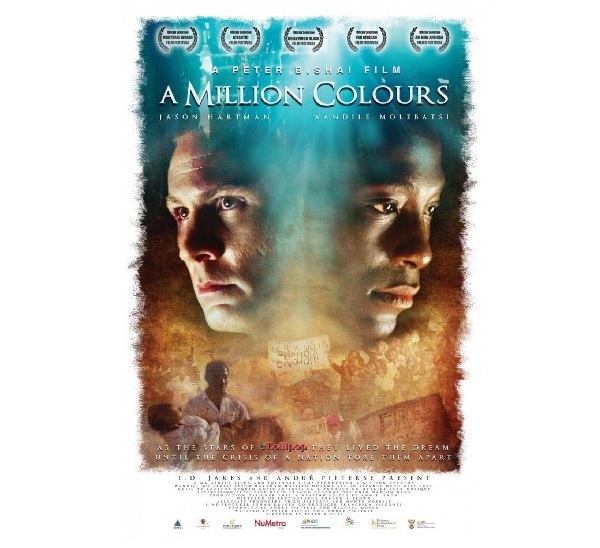Title: “A Million Colours”
Director: Peter Bishai
Starring: Wandile Molebatsi, Jason Hartman, Masello Motana, Stelio Savante, Mpho Osei Tutu,
Running Time: 120 Minutes, No Rating
“A Million Colours” positions itself as a story of friendship and love set in the middle of South Africa’s Apartheid struggles, but it’s a lot more than that. The story is, to me, one that focuses much more on the life of real life child star from 1975’s “e’Lollipop” Muntu Ndebele (Molebatsi) than it is about his deep friendship with his co-star Norman Knox (Hartman) and even Muntu’s love for the quiet Sabela (Motana). The film delves deep into Muntu’s life, including his descent from a young man with the world at his feet to a down-and-out drug addict that had seen too much bloodshed and crime.
As stated above, the film is based on the lives of real people. Muntu and Norman both starred in “e’Lollipop” as children and developed a brotherhood despite the differences in their skin and the coming harshnesss of Apartheid. However, as Apartheid took hold of South Africa, it not only divided the nation, but it divided their bond as well–both friends were drafted (or, in Muntu’s case, kidnapped) into armies fighting opposing sides. Apartheid mentally scarred Norman–he was routinely put in solitary confinement for refusing to renege on his friendship with Muntu and, in a fit of lunacy, blamed Muntu and the 1976 student uprising in Soweto that was the beginning of the spiral in both of their lives. But Muntu had a much larger battle to overcome, including stealing cars for crime boss Bomba (Osei Tutu), relying on alcohol and drugs and seeing many of his friends killed.
Muntu’s story is, without a doubt, the strongest story in the film. The story that starts Muntu’s journey in the film–his love for Sabela–later becomes a backdrop to the mental war Muntu is fighting. Molebatsi’s acting in the film is superb, exemplifying the compelling nature of Muntu’s life story. In fact, when the real life Muntu viewed the film, it’s reported he had to turn away because of how well Molebatsi inhabited the role.
The truth of the matter is that everyone (including actors and actresses not mentioned) crawled into their roles extremely well. Everyone in the film had their moment to give award-caliber performances (and indeed, the film did win the prize for Best Foreign Feature at the WorldFest Houston International Film Festival as well as two South African Academy Awards). But Molebatsi had a huge weight on his shoulders with the role of Muntu, and he was able to carry it with aplomb.
The film has been described as one that’s great to watch if you loved “Slumdog Millionaire,” and the description is right on the money. If you were riveted by the story of a young man overcoming much to regain his sense of self, then you’ll love “A Million Colours.” The ending is, perhaps, a bit too quick of a denouement, but it does provide relief to Muntu’s otherwise harrowing life. We leave the film with a huge emotional load, but the salve is knowing that Muntu did get a second chance and is now living his life to serve others.
Total Rating: A-
Reviewed by: Monique Jones

